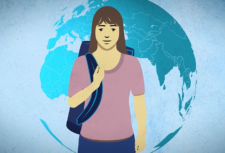Disclaimer: This article is more than 6 years old, and may not include the most up-to-date information or statistics. Please verify information with more recent sources as needed, and if you have any questions contact our Press Office.
Refusal of asylum can be devastating for trafficking victims, Megan Bethell and Neelam Banaris from the Snowdrop Project blog.

18 January 2018
Christmas is a special time for many of us. However, this Christmas for 5 of our women was overshadowed by the arrival of a letter. Instead of enjoying the holiday season, these 5 survivors were given a devastating letter refusing their asylum application.
Asylum seekers are seeking protection in a safe country, as they fear persecution (serious harm), in their own country. These women have been accepted by the government as survivors of human trafficking. They have been traumatised and scarred by their exploitative experiences. Whilst this is accepted, the negative asylum decisions overlook the long term devastating effects of their trauma and their future risk of harm.
After years of waiting to find out if they are able to stay, years of their lives being on hold, an asylum decision is made telling them to return to their countries of origin. Countries where often their own authorities were involved in their trafficking. Countries where familial support no longer exists. Countries where they could face systemic stigma, isolation, shaming and even honour killings for having children out of wedlock. How can this be just?
“If the traffickers didn’t break me, I will not let this decision break me, I will fight. Returning home will mean the end.”
Anna*, trafficking survivor
As Neelam, a Senior Caseworker at the Project explains, “from a support perspective it’s one of the hardest things to provide empowering support, when somebody has had a refusal. They see it as a denial of their experiences. It’s hard to instil hope when the decision letters are so crude”.
These women have already experienced unimaginable pain and agony at the hands of their traffickers. They are suffering from ongoing complex mental health problems and then find themselves having to explain their “story” again, which is like, one client put it, “reliving my nightmare, with an audience”.
Neelam explains, “For Isabella*, one of my clients, this whole process has been extremely traumatic. She sobbed at me whilst saying ‘being asked how many clients I saw a day, is like being publicly stripped naked again and again.’ For her the refusal caused feelings of despair and resentment to such an extent, this client initially refused to engage with the Asylum process.”
Many of the ladies are single mothers, whilst they struggle to cope with this news, we witnessed the knock-on impact on their children, during a time when they should be enjoying the festivities. Neelam elaborates that, “Anna*, feels anger, she feels let down by the authorities. Her response to this knock back “if the traffickers didn’t break me, I will not let this decision break me, I will fight”; returning home for her will mean the end.”
Luckily these five ladies had solicitors in place. They have just 14 days to appeal this decision but 3 of these recent decisions were sent over the Christmas break when solicitors offices were closed. This meant representatives were returning from their break to refusals which needed to be submitted the very next day. Clients received calls out of the blue from solicitors rushing to meet deadlines, and therefore didn’t have time to digest the news. There was no time for face to face meetings, causing more distress and confusion for the clients.
These women find themselves in a system where the emphasis on immigration control often overshadows their need for safety and support. A system where their lived experiences are not always visible, understood or translated properly into documentation. These decisions have an earth shattering impact in all aspects of their lives. We are continuing to support those that the system is breaking and failing, we continue to instil hope where there is despair and we continue to give these women a voice so they can navigate the asylum system.
*names have been changed for client’s safety and dignity.
- The Snowdrop Project, based in Sheffield, provides long-term community support to empower survivors of human trafficking.
- They are members of the Anti-Trafficking Monitoring Group, a coalition of organisations monitoring the UK’s implementation of anti-slavery legislation.

Free For Good
Take action to ensure that slavery victims in the UK receive proper care so they can be free for good.





